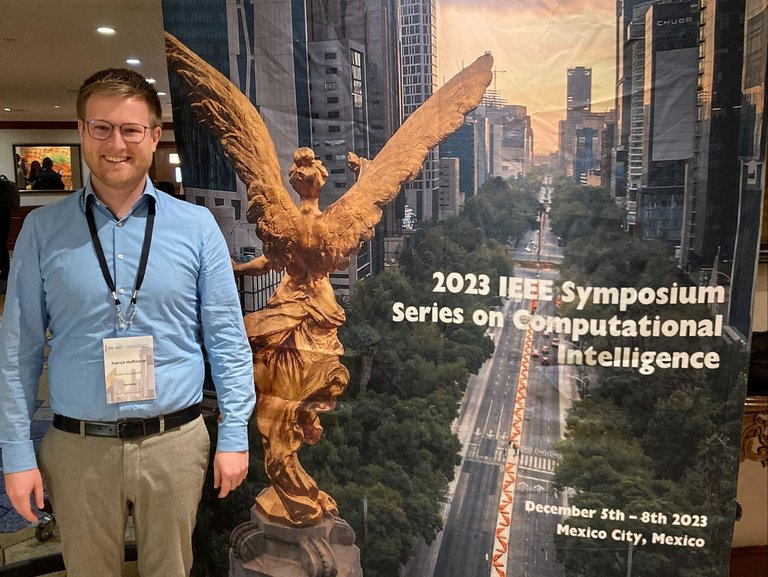Scientists from Technischen Universität Ilmenau and Robert Bosch GmbH have been honored at the renowned IEEE Symposium Series on Computational Intelligence (SSCI) for their pioneering contribution to AI-supported system design. The Best Paper Award went to M.Sc. Patrick Hoffmann and Dr. Kirill Gorelik from Robert Bosch GmbH in Renningen and PD Dr. habil. Valentin Ivanov from the TU Ilmenau. Their award-winning article entitled "Applicability Study of Model-Free Reinforcement Learning towards an Automated Design Space Exploration Framework" underlines the applicability of reinforcement learning for automated design space exploration using the example of future vehicle architectures and was published online on IEEE Xplore©.
Safer and more energy-efficient vehicle systems: Research cooperation paves the way for future developments in AI-supported system design

Motor vehicles should always be more energy-efficient, environmentally friendly, safer and more reliable. At the same time, they should also make driving as pleasant and entertaining as possible and be as inexpensive as possible. Cross-system integration is therefore an important trend in the automotive industry: in the context of electromobility, the electric drivetrain, brake-by-wire braking systems and steer-by-wire steering systems as well as a central electric/electronic architecture (E/E architecture) are connected across domains, creating new opportunities to improve vehicle dynamics.
However, this means that modern vehicles today are much more complex than they were just a few years ago. For example, the energy requirements of the entire vehicle and thus the range are determined not only by the drive components, but also by other consumers such as the steering or air conditioning. In conjunction with cross-divisional system integration, many different design variants are therefore conceivable.
Optimal operating strategies for different vehicle topologies
In view of this extensive scope for design, a design study is essential prior to vehicle construction in order to optimize vehicle functions and costs.
The challenge is to develop an individual operating strategy for every conceivable design in order to control all actuators optimally, which has only been possible with considerable manual effort up to now
explains Patrick Hoffmann, systems engineer at Robert Bosch GmbH and doctoral student at TU Ilmenau.
In their paper, which Hoffmann presented on behalf of the research group at the IEEE Symposium Series on Computational Intelligence in Mexico, the scientists from TU Ilmenau and Robert Bosch GmbH demonstrate an innovative AI approach that makes it possible to automatically generate optimal operating strategies for various vehicle topologies. They are using reinforcement learning (RL), which has proven to be particularly suitable in recent years for mastering complex control tasks efficiently and with reduced development time. This method of machine learning, in which a software agent independently learns a strategy according to the "trial and error" principle in order to maximize the rewards received, makes it possible to automatically identify optimal actuator controls and thus generate tailor-made operating strategies for a wide range of system configurations.
In their work, the scientists are not only investigating various driving conditions as well as different steering, braking and drive system combinations and arrangement options in the design space. Component dimensioning, redundant actuators and error cases are also being considered.
The aim of the investigations is to find alternatives to the classic vehicle design in which, for example, the brakes or drive ensure that the vehicle is kept safely on track even if a steering error occurs
explains Patrick Hoffmann.
In order to find a strategy for the correct control of all components in such cases, engineers currently have to make many settings manually based on control engineering methods. The scientists' new AI approach avoids such manual efforts in the optimal control of so-called multi-actuator systems and instead makes it possible to investigate different configurations automatically. With the help of a design-specific operating strategy, the system behavior can be comprehensively analyzed and different system designs can be efficiently compared with each other.
Successful collaboration as part of the digital mobility research offensive
The Best Paper Award not only underlines the outstanding performance of the researchers, but also the successful cooperation between the Thuringian Innovation Center Mobility with its research offensive 'Digital Mobility', the Control Engineering Group at TU Ilmenau and Robert Bosch GmbH
says Jochen Walther, Head of the "Advanced Vehicle Systems" department at Bosch Corporate Research and Advance Engineering:
'This pioneering research paves the way for future developments in the field of AI-assisted system design with the aim of safer and more energy-efficient systems.
The scientists now want to demonstrate their innovative approach to system design in further projects:
Our aim is to demonstrate the further benefits of these AI methods in interdisciplinary collaboration with industrial and research partners in Horizon Europe projects on new electric vehicle concepts such as OWHEEL, EM-TECH or SmartCorners
says Dr. Valentin Ivanov from the "Smart Vehicle Systems" working group at the Control Engineering Group.
The IEEE Symposium Series on Computational Intelligence (SSCI) took place in Mexico City from December 5 to 8, 2023. The annual flagship conference, organized by the IEEE Computational Intelligence Society, serves as a forum for multidisciplinary research on computational intelligence (CI, also known as soft computing), a subfield of artificial intelligence that deals with information processing in natural, especially biological systems and its implementation in algorithmic concepts for complex problems that are difficult or impossible to solve using conventional methods.
Publication
P. Hoffmann, K. Gorelik and V. Ivanov, "Applicability Study of Model-Free Reinforcement Learning Towards an Automated Design Space Exploration Framework," 2023 IEEE Symposium Series on Computational Intelligence (SSCI), Mexico City, Mexico, 2023, pp. 525-532, doi: 10.1109/SSCI52147.2023.10371864.
Contact us
Dr. Valentin Ivanov, Patrick Hoffmann
"Smart Vehicle Systems" Working Group at Control Engineering Group


